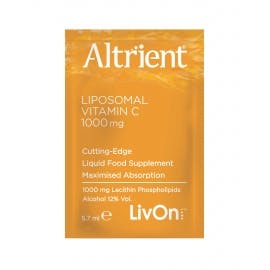How vitamin C can help alleviate pneumonia
Are you ready for Summer's end?
As our gorgeous English summer comes to a close the warm air is replaced by cool damp autumn air.
Couple this change with the fact that we are now faced with fewer hours of daylight and this is the sign your body needs to put your immune system on high alert, ready to fend off any bacterial or viral nose, throat or lung infections.
Time to get protected
If you tend to be someone who catches any autumn or winter cold, cough or a sore throat then now is the time to step-up your protection.
Firstly, make sure you wash your hands with antibacterial soap to help minimise your chances of picking up an infection from someone or something you have touched.
Next, swap a handkerchief for tissues and make sure you put used ones in the bin rather than stashing them in your pockets!
One way to fire-up the immune system is to include some fiery foods into your diet. Fresh root ginger can be sliced and added to herbal teas or hot water and lemon or it can be grated and added to a stir-fry or curry along with chilli and garlic, all of which help to boost the immune system.
Taking a daily vitamin C supplement is also a wise move throughout the autumn and winter months.
So how does vitamin C work to help your body fight infections? Well, vitamin C has anti-viral activity meaning it helps to activate, strengthen and increase the number of the specialised immune cells(phagocytes and lymphocytes) used by your body to fight infections.
The action of these immune cells helps prevent the virus from becoming stronger so that you can start winning your battle back to good health.
Watch out for lung infections
If you are unable to get on top of a cold or a cough, then these minor infections can spread into your chest and cause more serious lung infections such as bronchitis and pneumonia.
If we look back into history then we are given one very large clue as to how to best help ourselves when faced with pneumonia or any lung infection. Back in the early 1900’s American paediatrician Alfred Hess carried out some groundbreaking work on scurvy, a skin condition caused by severe vitamin C deficiency.
Hess noted that there was a direct link between scurvy and pneumonia and his work became so renowned that by the 1930’s vitamin C was being used as a treatment option for pneumonia and other lung conditions.
We now know that during a lung infection cells in the lungs come under a great deal of ‘oxidative stress’ which contributes to further damage of lung tissue. Vitamin C acts as a powerful antioxidant dampening down ‘oxidative stress’ and allowing cells to recover while also helping to boost the immune cells and actively help fight off the infection.
Getting the best vitamin C
So if you’re looking to boost your protection to reduce your chances of picking up an infection or if you need to actually shift an infection then my advice would be to opt for a vitamin C supplement.
When choosing a vitamin C, it’s important to look for one that is well absorbed, works quickly and is effectively delivered straight to the cells that are under stress.
Altrient C is a liposomal form of vitamin C and it’s this form that’s considered to be the most scientifically advanced. Liposomal simply means the vitamin C is cleverly wrapped in a layer or bubble of phospholipids.
Since all our cells also contain an outer layer or membrane of phospholipids the two can join together easily and quickly which enables the vitamin C to be absorbed into the bloodstream quickly and be delivered to cells in need with speed and agility.
Clever science indeed!
Written by Susie Perry


.jpg?auto=format&q=45&w=262&trim=auto)
.jpg?auto=format&q=45&w=262&trim=auto)
